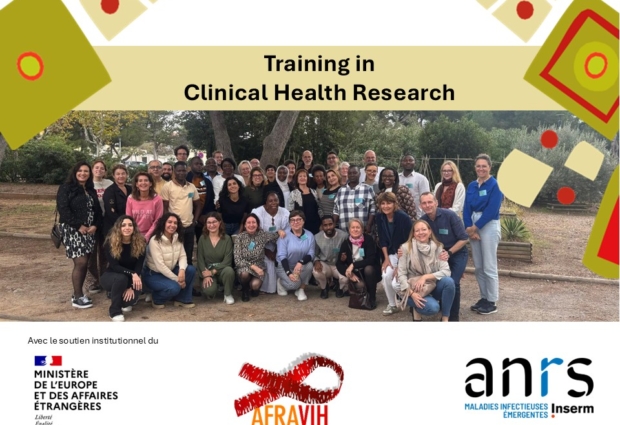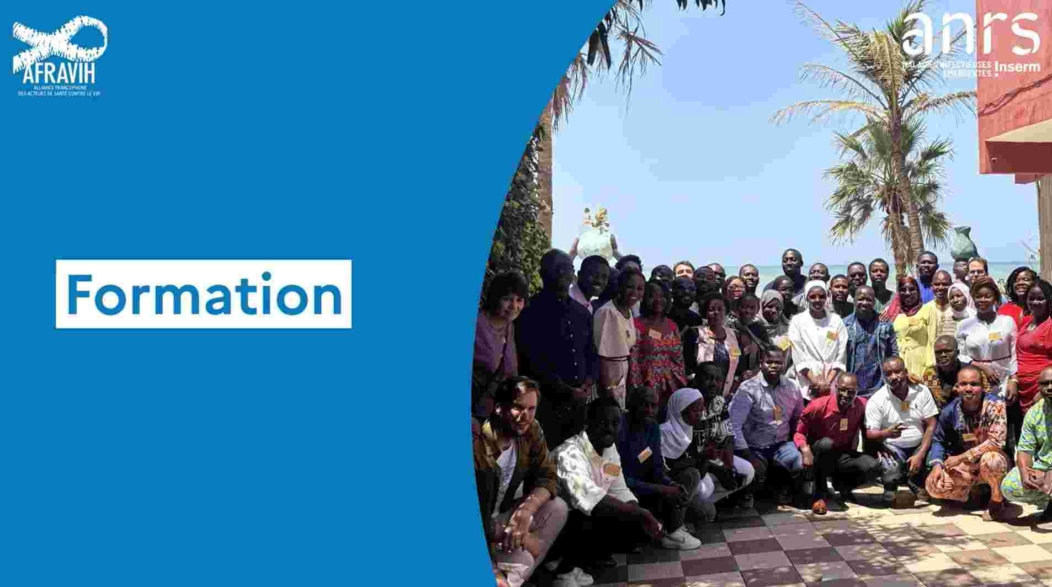
Training in Clinical Health Research
In partnership with ANRS MIE, AFRAVIH offers a new ‘Training course in clinical health research’ in 2025.
Last updated on 05 December 2025
In brief
In 2025, the AFRAVIH Clinical Research Course will be extended to include a more comprehensive 7-module training course, with a face-to-face component to be held in Saly, Senegal, from 7 to 10 April 2025, and an online learning format delivered from 14 April to June 2025.
Major advances in the treatment of viral infections, such as HIV and hepatitis, have been made possible by dynamic basic and clinical research. Many other topics are emerging, such as co-morbidities, associated infections, cancers and emerging infections. Maintaining and driving forward the research initiated, promoted and organised by the scientific community, particularly in Africa, is crucial. To make that happen, it is more important than ever to provide introductory research training courses, whether in the evaluation of therapeutic strategies and trials, or in operational research. It is also essential to promote independent research into new medicines and vaccines in Africa.
That’s why, in 2025, AFRAVIH, in partnership with ANRS MIE, proposed a new ‘Training in Clinical Health Research’ to enhance the skills needed to promote the autonomy of research in Africa.
And with over 80% success rate among learners, this new format is already a success! Both ANRS MIE and AFRAVIH are repeating it in 2027.
Details
Training modules
The course consists of 7 modules
- 2 face-to-face modules. The 4-day course will equip individuals with the necessary skills to develop a clinical research project
- 5 online learning modules
- Module 1 – Building a research project (face-to-face)
- Module 2 – Statistical principles used in the analysis of clinical trial data (face-to-face)
- Module 3 – Regulations, ethical and legal aspects, research funding (webinar)
- Module 4 – Research coordination and logistics (webinar)
- Module 5 – Pharmacovigilance (webinar)
- Module 6 – Legislation and the journey of investigational medicinal products (webinar)
- Module 7 – Special situations: a) Clinical research during an epidemic or crisis situations; b) Clinical research and vaccinology (webinar).
- Modules 1 & 2 are compulsory
- Attendance of these two modules alone will result in a certificate of attendance.
- It is not possible to follow the other modules without having attended the first two modules.
- Participation in all modules from 1 to 7 will result in certification for this clinical research training course.
- Participation in up to 4 of the 5 online learning modules (Modules 3 to 7) is possible, but does not confer a certificate.
Participants
The training is intended for doctors, biologists, pharmacists and researchers working on HIV infection, viral hepatitis, sexual health and emerging infections and who wish to develop their skills in clinical research.
View the full training programme
Face-to-face format: Clinical Research Workshop (modules 1 and 2)
The Clinical Research Workshop aims to provide training to clinicians/biologists, pharmacists and researchers who need knowledge to conduct clinical research.
The short 4-day course includes a practical approach and a theoretical approach exploring basic concepts of research.
The theoretical approach consists of plenary sessions with methodology presentations on the following topics:
- The different types of study in clinical research;
- Knowing how to create and defend a research question;
- Defining the objectives, population and inclusion criteria of the study;
- Designing the protocol and setting up the study;
- Choosing with methodologists the general principles of analysis and the number of patients necessary to test the clinical study hypothesis.
The practical approch consists of putting into practice the concepts learned or reviewed in plenary sessions through the development of a clinical research protocol:
- Each group includes 6 to 8 participants;
- This teamwork is coordinated by a clinician and a methodologist;
- Over a period of 3 days, each group must design, develop and present a clinical research study chosen according to its area of interest;
- At the end of the workshop, each group is required to deliver its clinical research protocol, which will be evaluated by the teaching committee.
Learning objectives
Strengthen skills in clinical research through:
- Training in research methodology
- The acquisition of skills in clinical research
- Training in research protocol writing
- An introduction to the monitoring and analysis of a clinical research project
Have the capacity to:
- know how to create a research question
- define the type of study adapted to your research
- organise the clinical study
- draft a research protocol
- know how to apply data analysis
Date and location
- The Clinical Research Workshop will take place from 7 to 10 April 2025 in Saly, Senegal.
- Participants and teachers will be accommodated in the same place to promote exchanges and build potential collaborative networks.
Online learning format: Training in Clinical Research (modules 3 to 7)
The workshop on clinical research has been redesigned to form a complete course, including five additional modules aimed at covering all aspects of clinical research, from regulatory and ethical aspects to publication and data archiving.
Module description:
- Module 3 – Regulatory framework, ethical and legal aspects, research funding (webinar)
- Provide an in-depth understanding of regulatory and ethical frameworks, as well as the funding mechanisms for clinical research.
- Module 4 – Research coordination and logistics (webinar)
- Develop skills in role management, coordination and logistics, ensuring the quality and compliance of clinical research.
- Module 5 – Pharmacovigilance (PV) (webinar)
- Training in pharmacovigilance principles, adverse event assessment and the basics of pharmacoepidemiology for signal detection and risk management.
- Module 6 – Legal framework and experimental drug journey (webinar)
- Acquiring legal skills and expertise in experimental drug journey, covering all stages of their management during clinical research.
- Module 7 – Special situations: Clinical research in vaccinology and/or in times of crisis (webinar)
- Strengthen your understanding of specific methodologies for clinical vaccine research and research strategies in crisis contexts.
Learning objectives
The training provides participants with an understanding of phases in the clinical trial process, addressing crucial topics such as:
- Regulatory and ethical frameworks
- Logistical coordination
- Pharmacovigilance
- Legal framework and experimental drug journey
- Vaccinology research and research in a crisis context
Training methods
Modules 3 to 7 will come in the form of online format over a period of three months, with each module lasting two weeks. Video conferencing lessons will be recorded and made available on the ANRS MIE e-learning platform. Additional materials (articles, resources) are also available.
Module components:
- Theoretical training: Videoconference lessons, and supporting documents and links on the ANRS MIE platform.
- Practical training: Interactive exercises with discussion forums, quizzes, and case studies to promote learning by doing.
- Assessment of knowledge: Self-assessment quizzes before and after each lesson to test the knowledge acquired.
- Strengthening knowledge: Knowledge exchange forum and a webinar helping to address specific questions and issues.
Date and location
- Online programme: from 14 April to June 2025.
- Duration of each module: maximum 2 weeks.

